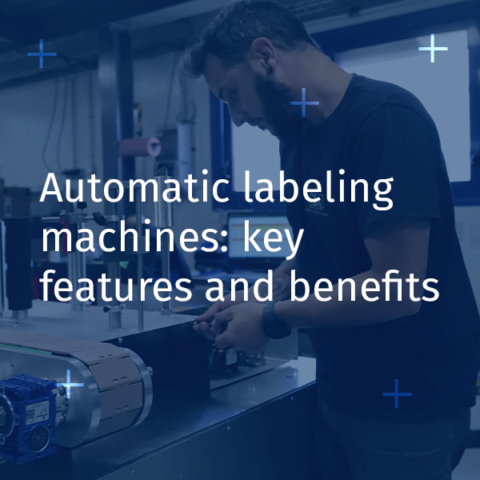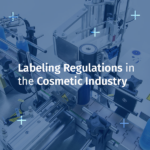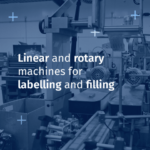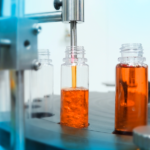Automatic labeling machines revolutionize modern production lines by boosting productivity, improving accuracy, and lowering labor costs.
In this article, we explore in detail the main features of these machines, their benefits for various industries, and best practices for ensuring optimal performance. Whether in the food, cosmetic, or pharmaceutical industry investing in an automatic labeling machine can be a strategic turning point for business growth.
Why Automation in Labeling is a game changer for modern production
Modern production processes require fast and reliable labeling solutions to meet increasing demand while maintaining quality and precision. Automating labeling processes addresses these challenges by ensuring consistent, error-free labeling, even at high speeds. Additionally, according to a PMMI (The Association for Packaging and Processing Technologies) study, companies using automatic labeling machines increase their production efficiency by 25% to 40% compared to manual or semi-automatic methods.
Key features of Automatic Labeling Machines
Automatic labeling machines come with a range of features that set them apart from manual or semi-automatic labelers. Here are the primary characteristics that make these machines a profitable investment for companies looking to automate their production lines:
1. High-Speed Labeling
Automatic labelers are designed to handle large quantities of products at high speeds without compromising labeling quality. Some machines can label up to 500 products per minute, making them ideal for large-scale production lines.
- Example: A beverage company using an automatic labeler was able to triple its production speed, from 200 to 600 bottles per minute, while reducing labor costs.
2. Precision and Accuracy
One of the main benefits of automatic machines (like the Ninon 1500) is their ability to apply labels with millimeter-level precision. Whether for cylindrical, conical, or flat containers, these machines use advanced sensors to position each label consistently, minimizing placement errors.
- Key Statistic: Labeling errors are reduced by 70% when using automatic machines compared to manual labeling.
3. Versatility for Different Product Types
Automatic labeling machines are often modular and can be configured to handle various formats and product types (like the Ninon Mix): round bottles, square containers, jars, and even irregular shapes. They can also apply various label types, including wrap-around labels, shrink sleeves, and front-and-back labels.
- Benefit: An automatic labeler can handle up to 5 different product formats on a single line, reducing changeover requirements and improving flexibility.
Benefits of using Automatic Machines
Automatic labelers bring significant advantages in terms of productivity, cost reduction, and precision. Here are the main benefits:
1. Labor Cost Reduction
Using an automated labeling process reduces dependency on manual labor, which is especially useful in situations where labor costs are high. Fewer staff are needed to oversee the production line, allowing resources to be reallocated to higher-value tasks.
- Statistic: Companies that automate their labeling lines can save up to 30% on labor costs, according to a McKinsey study.
2. Increased Throughput and Efficiency
Automatic labelers significantly increase production throughput by enabling continuous high-speed labeling. They reduce downtime between cycles and ensure uninterrupted production, which is essential for large product series.
- Example: A cosmetic production plant doubled its annual output by integrating an automatic labeling machine, reaching 1 million bottles per year.
3. Reduced Human Error
Human errors, such as incorrect label placement or using the wrong label, can lead to costly recalls and damage the company’s reputation. Automatic labelers eliminate these errors through real-time control systems and high-precision sensors.
- Key Statistic: Companies using automatic machines report an 85% reduction in labeling errors compared to manual processes.
Industries that benefit the most from Automatic Labeling Machines
1. Beverage Industry
Beverage producers benefit from automatic labelers’ ability to handle high-speed production and adapt to various bottle formats (plastic, glass, aluminum). Automatic labelers also ensure compliance with nutritional and regulatory labeling requirements.
2. Cosmetics and Personal Care
The cosmetic industry uses automatic labelers to apply labels to containers of various shapes, often with transparent or embossed labels. The precision of these machines is crucial for ensuring brand image and visual appeal.
3. Pharmaceutical Industry
In the pharmaceutical sector, precision and traceability are critical. Automatic labelers integrate vision technology and quality control systems to ensure each label is correctly applied and readable, minimizing compliance risks.
Maintenance and downtime reduction: keeping your machine in top shape
To maximize the lifespan and performance of your automatic labeler, it’s essential to curate a proactive maintenance strategy. Here are some tips:
- Schedule Regular Inspections: Check critical components such as rollers and labeling heads to prevent wear.
- Clean Sensors and Heads: Dirty sensors can lead to label misalignment.
- Train Your Operators: Well-trained staff can quickly identify issues and minimize downtime.
Conclusion: Why investing in an Automatic Labeling Machine is essential for long-term growth







